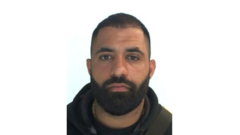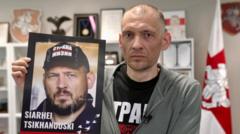Mark Lowen, a veteran BBC correspondent, recounts his traumatic experience of being detained and expelled from Turkey, shedding light on the current political climate amid nationwide protests.
BBC Journalist Mark Lowen's Brief Detention and Deportation from Turkey

BBC Journalist Mark Lowen's Brief Detention and Deportation from Turkey
In a shocking encounter, BBC's Mark Lowen discusses the abrupt turn of events leading to his deportation from Turkey after covering significant protests.
In a surreal twist of fate, just as BBC correspondent Mark Lowen expressed his happiness to be back in Turkey, he received an unexpected call from his hotel room, summoning him down to the lobby. Upon arrival, three plain-clothes police officers demanded his passport and escorted him away, attempting to obstruct his colleagues from documenting the incident. Initially in Istanbul to cover anti-government protests ignited by the arrest of prominent mayor Ekrem Imamoglu, Lowen suddenly found himself at the mercy of Turkey's authorities.
Held for seven hours at police headquarters, Lowen was able to converse with a couple of lawyers and colleagues, with a surprising level of civility from some officers. Despite this cordial interaction, things took a darker turn once he was transferred to a foreigners' custody unit. Isolated from any external communication and subjected to clearer scrutiny, he was fingerprinted and denied access to legal representation. The grim reality of his situation became undeniable when he was informed of his deportation on charges of being a “threat to public order.”
After a harrowing night spent in a designated airport holding area, marked by an inability to sleep amid constant disruptions, Lowen was ultimately placed on a flight back to London. While the Turkish government later claimed a lack of proper accreditation on his part, this rationale was never mentioned during his detention, raising questions about the legitimacy of the action taken against him.
Throughout the ordeal, Lowen acknowledged the extensive support from BBC management and the British Consulate, contrasting his situation with that of countless others facing similar fates without such backing. This incident serves as a grim reminder of Turkey's troubling position regarding press freedom; as noted by Reporters Without Borders, the country ranks 158th among 180 nations. Currently, the nation is witnessing widespread protests against President Erdogan's regime, particularly following Imamoglu's contentious arrest, which has galvanized public demand for democracy amid growing authoritarianism. The future of these protests remains uncertain, as President Erdogan continues to dismiss them as mere "street terrorism," emboldened by international alliances and strategic significance in global politics.





















